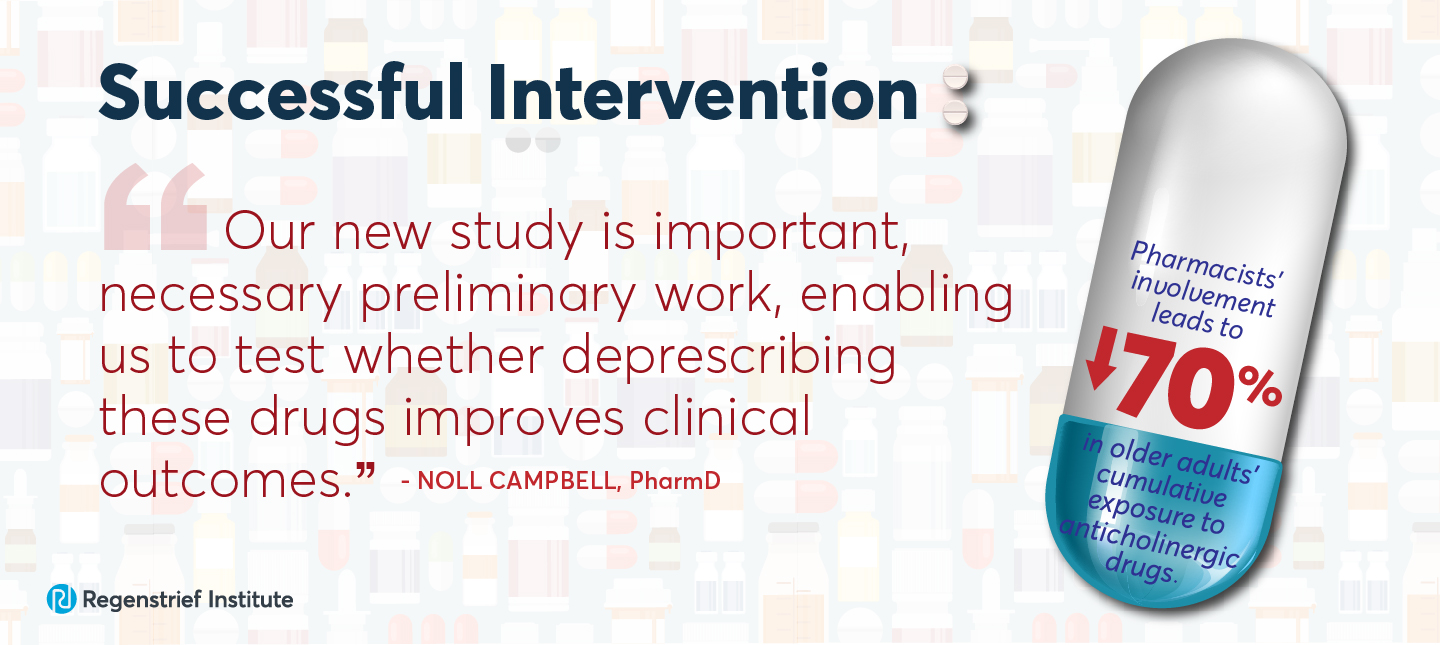Anticholinergics, a class of drugs frequently prescribed for depression, urinary incontinence and many other conditions common in older adults, affect the brain by blocking acetylcholine, a nervous system neurotransmitter which influences memory, alertness and planning skills. A new study from Regenstrief Institute, Purdue University College of Pharmacy and Indiana University School of Medicine researchers has found that using pharmacists as deprescribing care coordinators decreased prescription of anticholinergics by 73 percent and reduced cumulative use of these drugs by as much as 70 percent.
“Our new study is important, necessary preliminary work, enabling us to test whether deprescribing these drugs improves clinical outcomes,” said Regenstrief Institute and Purdue College of Pharmacy faculty member Noll Campbell, PharmD, M.S., who led the new study to develop pharmacist-centric delivery models to successfully switch patients to safer drugs. “Tackling deprescribing has not been easy. That pharmacist-centric deprescribing models work so well does not surprise me because pharmacists are well suited for the task. They are knowledgeable about medications, often have a close relationship with the patients and are well trained to communicate with providers.”
The researchers developed two pharmacist-focused deprescribing models. One, a face-to-face model involved pharmacists meeting with and monitoring older adult patients being seen in an aging brain care clinic. The second model, which involved pharmacist outreach via telephone to a generally older adult patient population encouraging safer medications, was less effective in diminishing exposure to anticholinergics but more effective than other methodologies, including clinician alerts in electronic health records (EHRs). Collectively, these models decreased prescription of anticholinergics by 73 percent and reduced cumulative use of these drugs by as much as 70 percent.
“Deprescribing anticholinergics in primary care older adults: Experience from two models and impact on a continuous measure of exposure” is published in the peer-reviewed Journal of the American College of Clinical Pharmacy (JACCP). Authors, in addition to Dr. Campbell are Christopher Callahan, M.D., and Malaz Boustani, M.D., MPH, Regenstrief Institute, IU School of Medicine and Eskenazi Health; Christopher Pitts, PharmD, and Parveen Chand, MHA, IU Health; Claire Corvari, PharmD, Franciscan Health; Ellen Kaehr, M.D., IU School of Medicine; Khalid Alamer, PharmD, PhD candidate, Purdue University College of Pharmacy; Kristine Nanagas, M.D., IU Health and IU School of Medicine.
The study was supported by the National Institutes of Health’s National Institute on Aging [K23AG044440 and R01AG061452] and the Agency for Healthcare Research and Quality [P30HS2 4384].
Using the human-intensive deprescribing methodologies described in the JACCP paper, Regenstrief researchers are currently conducting R2D2 — an acronym for “Reducing Risk of Dementia through Deprescribing” to determine whether the adverse cognitive effects of anticholinergic medications are reversible. In this study, which is currently recruiting patients, clinical pharmacists are working with physicians and their patients who are using anticholinergics to identify and switch to safer alternative medications. The trial also monitors the effect of deprescribing these medications on depression, anxiety, pain, insomnia, and quality of life. Dr. Campbell leads this National Institutes of Health’s National Institute on Aging funded study.
About Noll Campbell, PharmD, M.S.
In addition to his role as a research scientist at Regenstrief Institute, Noll Campbell, PharmD, M.S., is an associate professor of pharmacy practice at the Purdue University College of Pharmacy. He is an adjunct assistant professor of medicine at IU School of Medicine and maintains an active clinical practice as a geriatric pharmacotherapy expert within Eskenazi Health.
About Regenstrief Institute
Founded in 1969 in Indianapolis, the Regenstrief Institute is a local, national and global leader dedicated to a world where better information empowers people to end disease and realize true health. A key research partner to Indiana University, Regenstrief and its research scientists are responsible for a growing number of major healthcare innovations and studies. Examples range from the development of global health information technology standards that enable the use and interoperability of electronic health records to improving patient-physician communications, to creating models of care that inform practice and improve the lives of patients around the globe.
Sam Regenstrief, a nationally successful entrepreneur from Connersville, Indiana, founded the institute with the goal of making healthcare more efficient and accessible for everyone. His vision continues to guide the institute’s research mission.
About Purdue University College of Pharmacy
The mission of the Purdue University College of Pharmacy is to advance scientific discovery and development, maximize global health outcomes through patient care and public service, and educate and train students to become leading pharmacists and scientists. The goal is to transform the practice and science of pharmacy to lead advances in human health.
About IU School of Medicine
IU School of Medicine is the largest medical school in the U.S. and is annually ranked among the top medical schools in the nation by U.S. News & World Report. The school offers high-quality medical education, access to leading medical research and rich campus life in nine Indiana cities, including rural and urban locations consistently recognized for livability.











